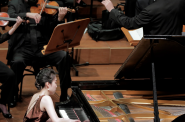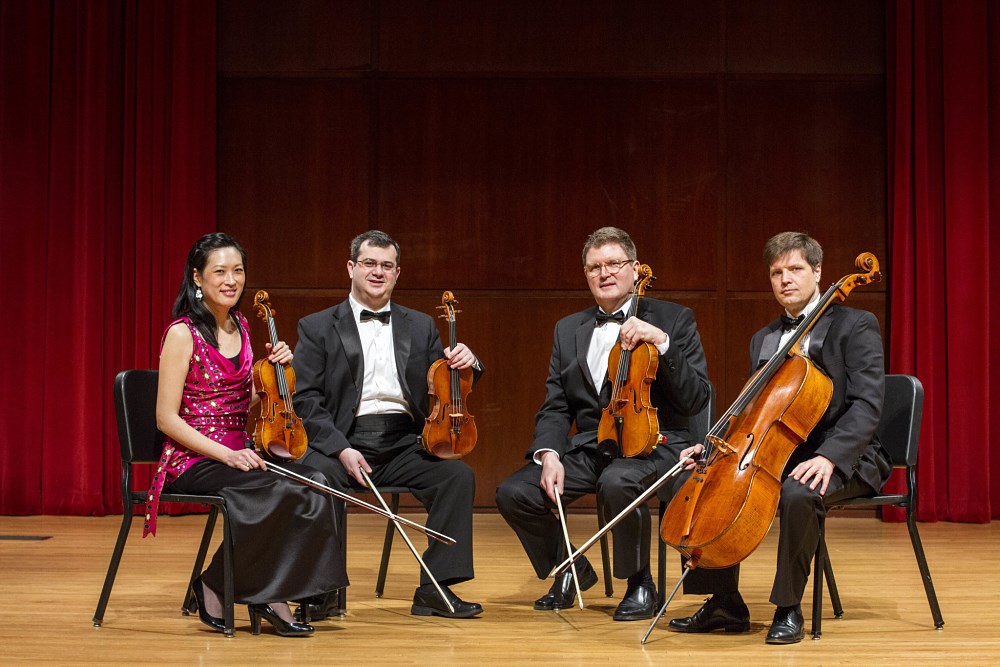Philomusica Quartet Offers American Themes
With Dvorák's 'American' string quintet and two works by American women.
The Philomusica Quartet will celebrate a Vibrant Spring in a chamber concert Monday evening at Wisconsin Lutheran College.
The Quartet, violinists Jeanyi Kim and Alexander Mandl, violist Nathan Hackett and cellist Adrien Zitoun, will be joined by Robert Levine, principal violist with the Milwaukee Symphony Orchestra.
An active chamber musician, Levine was once a member of Toronto’s Orford Quartet. His active commitment to issues concerning orchestra musicians locally to internationally has limited his availability for guest chamber appearances.
Dvorák incorporated themes and rhythms from American Indian and Afro-American music. Mandl points out that the simple pentatonic five-note scale used in Bohemian village music was also appropriate for interpreting Indian and Afro-American tunes. The scherzo also incorporates a complex rhythm that Dvorák heard at programs by an Iroquois performing group during a summer in Spillville, Iowa, a town settled by Czechs.
The Philomusica will expand the theme with two works by African American women.
Jessie Montgomery, a contemporary composer and violist found an appreciative audience for her energetic Strum for String Quartet (2006). As melodies move around the players, others accompany with a pizzicato reminiscent of banjo strumming. Montgomery writes that the composition salutes “American folk idioms and the spirit of dance and movement.” You can preview this short work with Montgomery on viola with the Catalyst Quartet. The popular work was reprised in a version for orchestra that the Milwaukee Symphony Orchestra has performed.
The Quartet will also play String Quartet No. 1 in G major (1929) by Florence Price (1887-1953). Price is noted as the first African-American woman to be recognized as a symphonic composer, and the first to have a composition played by a major orchestra. Price composed over 300 works: four symphonies, four concertos, as well as choral works, art songs, chamber music and music for solo instruments. Her contribution has received renewed attention in recent years. In 2009, a substantial collection of her works and papers was found in her abandoned summer home.
Program notes by Emlyn Johnson executive director of the group Pro Musica, describe the quartet by Price:
“The first movement is reminiscent of late Romantic string quartets by composers like Grieg and Borodin. The first theme is sweeping and hopeful, followed by a magical transition to the waltzing second theme first presented in the viola. The second movement takes a more songlike approach, presenting a lushly harmonized folk-inspired melody that begins and ends the movement. The two iterations of this beautiful melody are divided by a contrasting section with a lively lightness reminiscent of ballet music.”
A rare reconstructed chamber work by Giacomo Puccini (1858-1924) will complete the concert. His String Quartet in D Major (c. 1880-1883) has basically been lost. But adaptations of the Quartet for other chamber instruments have been reverse-engineered to recreate the original. The Philomusica will play the first movement, Allegro moderato; the only movement with the original string scores intact.
The American sound was to be revised by Aaron Copland with a very different compositional style, but these late romantic works, including the recent one by Montgomery, share a popular attraction, with open melodies inspired by American themes and a simplicity often underscored by the use of the more transparent five-note pentatonic scale.
The Philomusica concert begins at 7:30 p.m. at Schwan Hall (8815 W. Wisconsin Ave.) on the Wisconsin Lutheran Campus on Monday, April 22. Tickets may be purchased at the box office (414-443-8802) or online.
If you think stories like this are important, become a member of Urban Milwaukee and help support real, independent journalism. Plus you get some cool added benefits.
Preview
-
PianoArts Festival Features Rising Stars
 May 28th, 2024 by Michael Barndt
May 28th, 2024 by Michael Barndt
-
Four Nations Ensemble Goes For Baroque
 May 13th, 2024 by Michael Barndt
May 13th, 2024 by Michael Barndt
-
Mozart on Prospect Avenue
 May 9th, 2024 by Martha Brown
May 9th, 2024 by Martha Brown



















